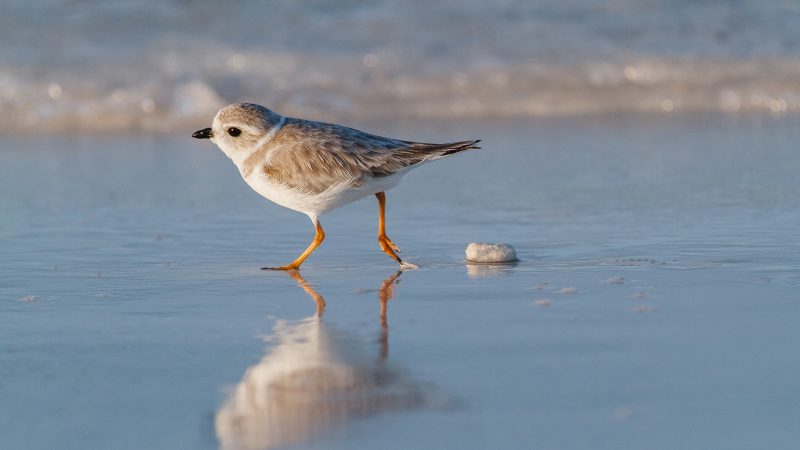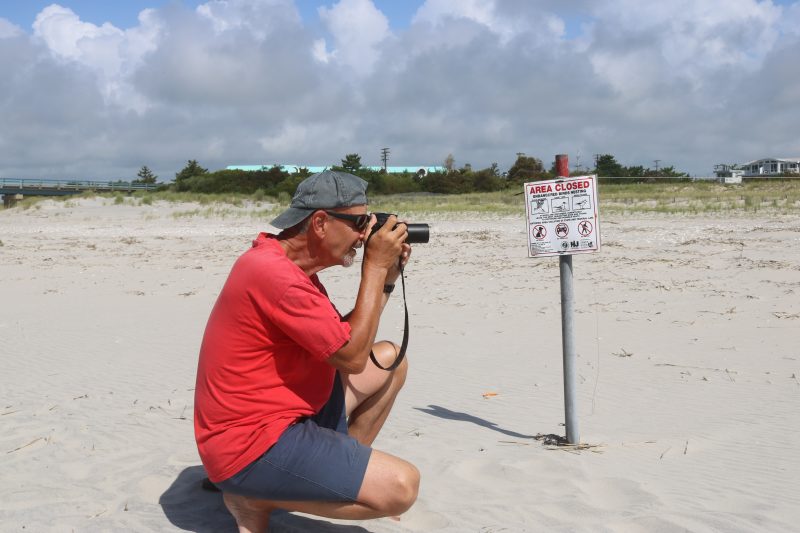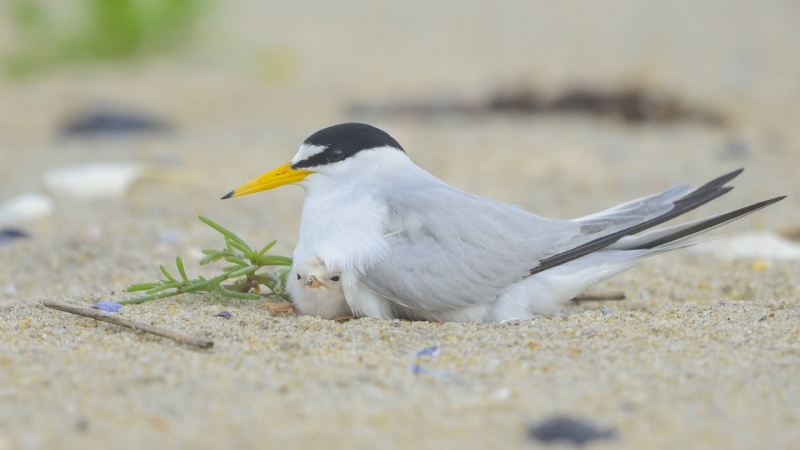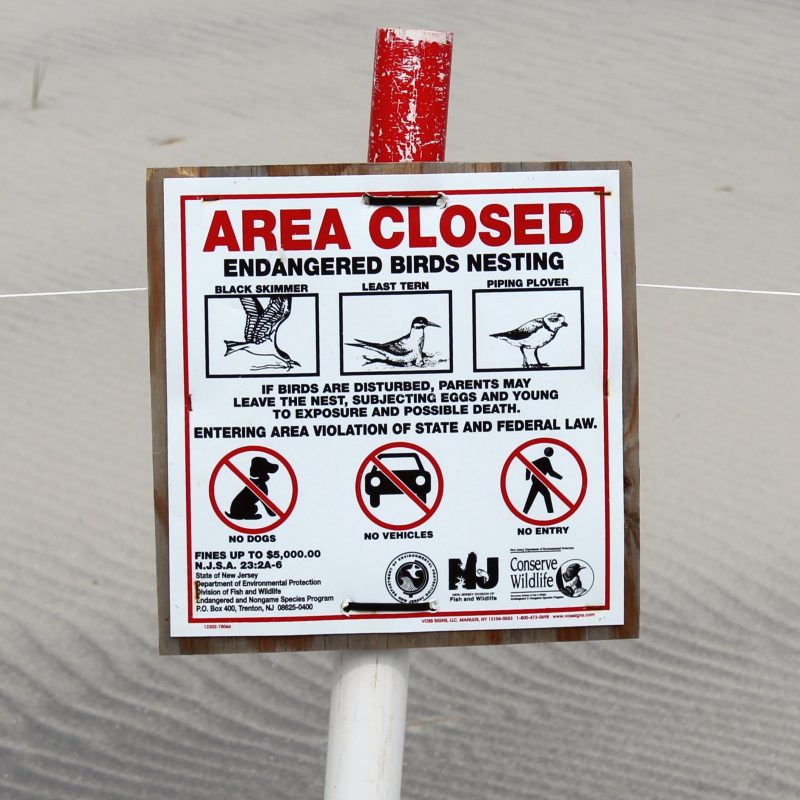Piping plovers are among birds that nest in Sea Isle City. (Photo courtesy of Audubon.org)
 By MADDY VITALE
By MADDY VITALE
Small areas at certain beaches at the shore become vital nesting spots for three types of birds.
Townsends Inlet beach in Sea Isle City is one of those beaches because it meets the needs for nesting piping plovers, least terns and black skimmers.
The New Jersey Department of Environmental Protection’s Endangered and Nongame Species Program has installed a temporary barrier to keep people from entering an area of the beach at Townsends Inlet, which is a known nesting location for the three birds, as well as some others.
“It’s very important that we continue to protect our natural resources and our shoreline – and Sea Isle City is happy to cooperate with the DEP each year to protect this sacred space,” Mayor Leonard Desiderio said in a statement Thursday.
The restricted area is surrounded by signage and ropes. The area is adjacent to the east side of the Townsends Inlet Bridge and surrounds all of the dunes on the ocean side of the inlet.
“Only a small area around the dunes is cordoned off to protect the wildlife, so there is still plenty of room for people to enjoy activities while visiting the inlet,” Desiderio said in the statement.
He also urged the public to “please respect this area.”

A birdwatcher takes a photo of a least tern from a safe distance during a prior nesting season.
The refuge in Sea Isle is one of a series of DEP-supervised nesting areas along the New Jersey coast designed to help shorebirds that are under pressure from predators and loss of habitat, including least terns, American oyster catchers, piping plovers and black skimmers.
Devin Griffiths, marketing and communication specialist at the Wetlands Institute in Stone Harbor, said in an interview Thursday with
SeaIsleNews.com
that there are several areas used for these nesting birds in Cape May County.
In addition to Sea Isle’s beach, Cape May Point and Stone Harbor Point have spots for the nesting birds cordoned off.
While the slivers of beaches used for the birds seem small in comparison to the wide sandy beaches that have come through recent beach replenishment projects as well as Mother Nature, they are extremely important to the survival of the birds, Griffiths noted.
“The birds using these areas require the sandy beaches to lay their eggs and nest. That is their habitat and if they don’t have the habitat, they can’t nest and raise chicks,” he pointed out. “It is an absolutely critical habitat. They are species that are struggling as it is, particularly the piping plovers.”
Griffiths also said that it is important to emphasize to the public that the beaches are open.
“This is really a way of letting people know that they are not alone on the beach. There are other species there," he said. "We can choose where we go. The birds don’t have a choice. They need to find suitable nesting areas. There is a way to balance between the recreational needs of people and the needs of the birds, and this is really the way it is done.”

A least tern protects one of its chicks in a nesting colony on the beach. (Courtesy Kevin Knutsen)
The birds start coming back in mid-April and nest in May and June and raise the chicks in the middle of the summer, Griffiths added.
DEP representatives in the Woodbine office will monitor the area in the coming months to determine which species of birds are nesting there.
The ropes and signage in Townsends Inlet are expected to remain in place through most of the summer season. However, the length of time the barrier remains is dependent on what species of wildlife are seen in the restricted area, according to a Sea Isle news release.
Beachgoers are reminded to heed the posted signs and ropes. Entering the restricted area is a violation of state and federal law, and fines of up to $5,000 may be issued if vehicles, humans or pets enter the restricted zone.
“The takeaway is that the species that the state is trying to protect with the cordoned off areas are all species that need our protection in order to thrive,” Griffiths said. "We can't forget that. By not going in those areas, we are doing so much to help the birds."
To learn more about the New Jersey Department of Environmental Protection, go to https://www.nj.gov/dep/

A closeup of the sign that has been placed in the nesting area in Townsends Inlet. (Photo courtesy of Sea Isle City)
 By MADDY VITALE
Small areas at certain beaches at the shore become vital nesting spots for three types of birds.
Townsends Inlet beach in Sea Isle City is one of those beaches because it meets the needs for nesting piping plovers, least terns and black skimmers.
The New Jersey Department of Environmental Protection’s Endangered and Nongame Species Program has installed a temporary barrier to keep people from entering an area of the beach at Townsends Inlet, which is a known nesting location for the three birds, as well as some others.
“It’s very important that we continue to protect our natural resources and our shoreline – and Sea Isle City is happy to cooperate with the DEP each year to protect this sacred space,” Mayor Leonard Desiderio said in a statement Thursday.
The restricted area is surrounded by signage and ropes. The area is adjacent to the east side of the Townsends Inlet Bridge and surrounds all of the dunes on the ocean side of the inlet.
“Only a small area around the dunes is cordoned off to protect the wildlife, so there is still plenty of room for people to enjoy activities while visiting the inlet,” Desiderio said in the statement.
He also urged the public to “please respect this area.”
By MADDY VITALE
Small areas at certain beaches at the shore become vital nesting spots for three types of birds.
Townsends Inlet beach in Sea Isle City is one of those beaches because it meets the needs for nesting piping plovers, least terns and black skimmers.
The New Jersey Department of Environmental Protection’s Endangered and Nongame Species Program has installed a temporary barrier to keep people from entering an area of the beach at Townsends Inlet, which is a known nesting location for the three birds, as well as some others.
“It’s very important that we continue to protect our natural resources and our shoreline – and Sea Isle City is happy to cooperate with the DEP each year to protect this sacred space,” Mayor Leonard Desiderio said in a statement Thursday.
The restricted area is surrounded by signage and ropes. The area is adjacent to the east side of the Townsends Inlet Bridge and surrounds all of the dunes on the ocean side of the inlet.
“Only a small area around the dunes is cordoned off to protect the wildlife, so there is still plenty of room for people to enjoy activities while visiting the inlet,” Desiderio said in the statement.
He also urged the public to “please respect this area.”
 A birdwatcher takes a photo of a least tern from a safe distance during a prior nesting season.
The refuge in Sea Isle is one of a series of DEP-supervised nesting areas along the New Jersey coast designed to help shorebirds that are under pressure from predators and loss of habitat, including least terns, American oyster catchers, piping plovers and black skimmers.
Devin Griffiths, marketing and communication specialist at the Wetlands Institute in Stone Harbor, said in an interview Thursday with SeaIsleNews.com
A birdwatcher takes a photo of a least tern from a safe distance during a prior nesting season.
The refuge in Sea Isle is one of a series of DEP-supervised nesting areas along the New Jersey coast designed to help shorebirds that are under pressure from predators and loss of habitat, including least terns, American oyster catchers, piping plovers and black skimmers.
Devin Griffiths, marketing and communication specialist at the Wetlands Institute in Stone Harbor, said in an interview Thursday with SeaIsleNews.com A least tern protects one of its chicks in a nesting colony on the beach. (Courtesy Kevin Knutsen)
The birds start coming back in mid-April and nest in May and June and raise the chicks in the middle of the summer, Griffiths added.
DEP representatives in the Woodbine office will monitor the area in the coming months to determine which species of birds are nesting there.
The ropes and signage in Townsends Inlet are expected to remain in place through most of the summer season. However, the length of time the barrier remains is dependent on what species of wildlife are seen in the restricted area, according to a Sea Isle news release.
Beachgoers are reminded to heed the posted signs and ropes. Entering the restricted area is a violation of state and federal law, and fines of up to $5,000 may be issued if vehicles, humans or pets enter the restricted zone.
“The takeaway is that the species that the state is trying to protect with the cordoned off areas are all species that need our protection in order to thrive,” Griffiths said. "We can't forget that. By not going in those areas, we are doing so much to help the birds."
To learn more about the New Jersey Department of Environmental Protection, go to https://www.nj.gov/dep/
A least tern protects one of its chicks in a nesting colony on the beach. (Courtesy Kevin Knutsen)
The birds start coming back in mid-April and nest in May and June and raise the chicks in the middle of the summer, Griffiths added.
DEP representatives in the Woodbine office will monitor the area in the coming months to determine which species of birds are nesting there.
The ropes and signage in Townsends Inlet are expected to remain in place through most of the summer season. However, the length of time the barrier remains is dependent on what species of wildlife are seen in the restricted area, according to a Sea Isle news release.
Beachgoers are reminded to heed the posted signs and ropes. Entering the restricted area is a violation of state and federal law, and fines of up to $5,000 may be issued if vehicles, humans or pets enter the restricted zone.
“The takeaway is that the species that the state is trying to protect with the cordoned off areas are all species that need our protection in order to thrive,” Griffiths said. "We can't forget that. By not going in those areas, we are doing so much to help the birds."
To learn more about the New Jersey Department of Environmental Protection, go to https://www.nj.gov/dep/
 A closeup of the sign that has been placed in the nesting area in Townsends Inlet. (Photo courtesy of Sea Isle City)
A closeup of the sign that has been placed in the nesting area in Townsends Inlet. (Photo courtesy of Sea Isle City)